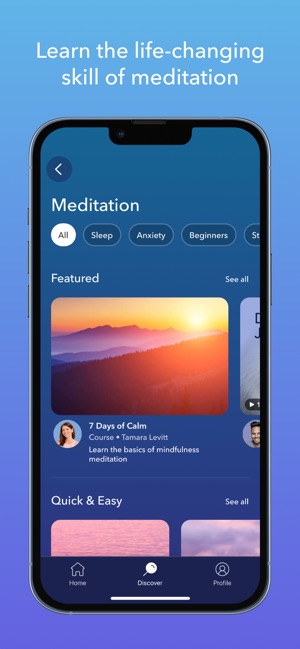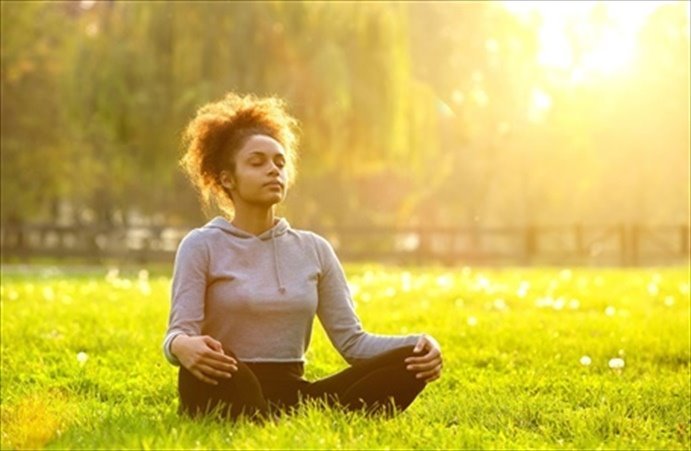Key Takeaways
- Calming apps like Calm and Headspace are designed to reduce stress and improve mental well-being through guided meditations and mindfulness exercises.
- These apps often include features like breathing exercises, sleep stories, and calming music to enhance relaxation.
- MindShift CBT uses cognitive-behavioral therapy techniques to help manage anxiety and stress.
- Pzizz focuses on improving sleep quality through soundscapes and nap plans, making it ideal for those struggling with insomnia.
- Most apps offer free trials or basic versions, allowing users to explore features before committing to a subscription.
Discover the Top Calming Apps for Mental Health and Mindfulness
In today’s fast-paced world, finding moments of calm can be challenging. With constant notifications and endless to-do lists, it’s no wonder many of us feel overwhelmed. Fortunately, technology offers a solution through calming apps designed to promote mindfulness and mental well-being. These apps provide tools to help you relax, reduce anxiety, and improve your overall mental health.

“meditation app …” from www.popsci.com and used with no modifications.
“By downloading and using calming apps, we may be able to turn a source of stress into a source of calmness.” – Expert Insight
Whether you’re new to mindfulness or looking to deepen your practice, there’s an app out there to suit your needs. In this article, we’ll explore some of the best calming apps available and how they can help you achieve greater peace and relaxation.
Introduction to Calming Apps
Calming apps are designed to help users find moments of peace and relaxation in their daily lives. They offer a variety of features, from guided meditations and breathing exercises to sleep stories and calming music. These tools are crafted to reduce stress, improve focus, and enhance overall mental well-being.
The popularity of calming apps has grown significantly in recent years, as more people recognize the importance of mental health and mindfulness. With the rise of smartphones, accessing these resources has never been easier. But with so many options available, it can be challenging to know where to start.
Features to Look for in Calming Apps
When choosing a calming app, it’s essential to consider the features that will best support your mental health goals. Here are some key features to look for:
- Guided Meditations: Look for apps that offer a variety of guided meditations tailored to different needs, such as stress reduction, sleep improvement, or anxiety management.
- Breathing Exercises: Breathing techniques can help calm the mind and reduce stress. Many apps include guided breathing exercises to help you practice these techniques effectively.
- Sleep Support: If you’re struggling with sleep, consider apps that offer sleep stories, soundscapes, or nap plans to help you relax and drift off more easily.
- Personalization: The ability to customize your experience is crucial. Look for apps that allow you to set goals, track progress, and tailor content to your preferences.

“15 Minute Guided Meditation To Find …” from www.youtube.com and used with no modifications.
Benefits of Using Calming Apps
Calming apps offer numerous benefits for mental health and well-being. By incorporating these tools into your daily routine, you can experience a range of positive effects, including:
Reduced Stress and Anxiety: Regular use of calming apps can help lower stress levels and alleviate anxiety. The guided meditations and breathing exercises provide a structured way to calm the mind and body.
Improved Sleep Quality: Many calming apps include features specifically designed to enhance sleep quality. By using these tools, you can establish a bedtime routine that promotes relaxation and restful sleep. For more options, consider exploring the best meditation apps that can aid in improving your sleep patterns.
Increased Mindfulness: Practicing mindfulness helps you stay present and focused in the moment. Calming apps offer exercises and meditations that cultivate mindfulness, leading to greater awareness and clarity.
Best Apps for Mindfulness and Relaxation
“Apps like Calm and Headspace have been shown to improve symptoms of depression and stress.” – Research Findings
Let’s dive into some of the top calming apps available today. Each app offers unique features and benefits, making them suitable for different needs and preferences.

“Calm on the App Store” from apps.apple.com and used with no modifications.
Calm: Features and User Experience
Calm is one of the most popular mindfulness apps, known for its user-friendly interface and comprehensive range of features. It offers guided meditations, sleep stories, and calming music to help users relax and unwind. With a library of over 100 meditations, Calm caters to a wide range of mental health needs.
One standout feature is the “Daily Calm,” a new meditation each day that focuses on different themes, such as gratitude or self-compassion. This daily practice helps users build a consistent mindfulness routine.
Headspace: Meditation Made Simple
Headspace is another leading app in the mindfulness space, offering a structured approach to meditation. It provides guided sessions that teach the fundamentals of mindfulness and meditation, making it ideal for beginners. For those interested in understanding more about the mind, exploring key brain regions can be beneficial.
The app’s “Basics” course is a great starting point, introducing users to key meditation techniques. As you progress, Headspace offers more advanced courses and themed meditations, allowing you to tailor your practice to your needs.
Pzizz: Sleep and Napping Solutions
If sleep is your primary concern, Pzizz is an excellent choice. This app focuses on improving sleep quality through soundscapes and nap plans. It uses a combination of music, voice, and sound effects to create relaxing environments that help you fall asleep faster and stay asleep longer.
Pzizz also offers a “Power Nap” feature, designed to provide a quick energy boost during the day. By using these tools, you can establish a healthy sleep routine and enjoy more restful nights.
MindShift CBT: Cognitive Behavioral Tools
MindShift CBT is an app designed to help users manage anxiety using cognitive-behavioral therapy (CBT) techniques. This app offers a range of tools and strategies to help users understand and change their thought patterns. By addressing negative thoughts and behaviors, MindShift CBT aims to reduce anxiety and promote mental well-being.
The app includes features like thought journals, goal setting, and relaxation exercises. These tools empower users to take control of their mental health and develop healthier coping mechanisms. With MindShift CBT, you can learn to challenge anxious thoughts and replace them with more balanced and realistic perspectives.
Improving Sleep and Reducing Anxiety
Quality sleep is essential for maintaining good mental health, yet many people struggle with insomnia and anxiety-related sleep disturbances. Calming apps can play a crucial role in improving sleep quality and reducing anxiety.
Bettersleep: Enhance Sleep Quality
Bettersleep is an app specifically designed to improve sleep quality. It offers a variety of features, including sleep sounds, bedtime stories, and guided meditations. These tools help create a calming bedtime routine that promotes relaxation and restful sleep.
The app also includes a sleep tracker, allowing users to monitor their sleep patterns and identify areas for improvement. By using Bettersleep, you can develop a personalized sleep plan that addresses your unique needs and preferences.

“Breathing Techniques for an Internal …” from www.everydayyoga.com and used with no modifications.
Breathing Techniques in Apps
- Deep Breathing: This technique involves taking slow, deep breaths to help calm the mind and body. Many apps offer guided deep breathing exercises to help users practice this technique effectively.
- Box Breathing: Box breathing is a simple yet powerful technique that involves inhaling, holding, exhaling, and pausing for equal counts. It’s a great way to manage stress and anxiety in the moment.
- 4-7-8 Breathing: This technique involves inhaling for four counts, holding for seven counts, and exhaling for eight counts. It’s designed to promote relaxation and improve focus.
Breathing techniques are a cornerstone of many calming apps, as they provide an accessible and effective way to reduce stress and anxiety. By practicing these techniques regularly, you can develop greater control over your body’s stress response.
Most importantly, these exercises can be done anywhere, making them a convenient tool for managing anxiety on the go. Whether you’re at work, school, or home, you can use breathing techniques to find moments of calm and clarity.
Guidance from Expert-Led Programs
Many calming apps are developed in collaboration with mental health professionals, ensuring that the content is evidence-based and effective. These expert-led programs provide users with reliable tools and strategies for managing stress and anxiety.
For example, the Healthy Minds Program app offers hundreds of hours of free guided meditations and teachings from psychology experts. This app focuses on cultivating qualities like awareness, connection, and purpose, helping users develop a more mindful and balanced approach to life.
Besides that, expert-led programs often include progress-tracking features, allowing users to monitor their growth and achievements. This feedback can be motivating and help users stay committed to their mindfulness journey.
App Content from Psychology Experts
When selecting a calming app, it’s essential to consider the expertise behind the content. Apps that feature content from psychology experts are more likely to provide effective and reliable tools for managing mental health.
Free and Premium Options
Most calming apps offer both free and premium versions, allowing users to explore features before committing to a subscription. Free versions typically include a limited selection of content, while premium subscriptions unlock additional features and resources.
By starting with a free trial or basic version, you can get a feel for the app’s offerings and determine if it meets your needs. If you find the app beneficial, upgrading to a premium subscription can provide access to a wider range of tools and support.
Additional Features to Explore
Beyond the core features of meditation and breathing exercises, many calming apps offer additional features that can enhance your mindfulness practice. These features provide a more comprehensive approach to mental health and well-being.
For instance, some apps include mood trackers, allowing users to log their emotions and identify patterns over time. This information can be valuable for understanding triggers and developing healthier coping strategies.
Integrated Breathing Exercises
Integrated breathing exercises are a common feature in calming apps, as they provide a quick and effective way to reduce stress and anxiety. By incorporating these exercises into your daily routine, you can develop greater resilience and emotional balance. For those looking to further enhance their focus, learning about the flow state can be beneficial.
Overall, calming apps offer a wealth of resources for improving mental health and mindfulness. By exploring different apps and features, you can find the tools that best support your unique needs and goals.
Sleep Stories and Soundscapes
Sleep stories and soundscapes are a unique feature of many calming apps, designed to help users relax and drift into a peaceful sleep. These auditory experiences combine soothing narratives with calming background sounds, creating an immersive environment that encourages restfulness. To further enhance relaxation, consider exploring optimism techniques that can complement these auditory experiences.
For example, Calm offers a variety of sleep stories narrated by well-known voices, such as Matthew McConaughey and Stephen Fry. These stories transport listeners to tranquil settings, making it easier to let go of the day’s stresses and embrace relaxation. Additionally, soundscapes like ocean waves or rainforest sounds can provide a comforting backdrop for a restful night’s sleep.
Conclusion on Calming Apps for Mental Wellness
Calming apps have become an invaluable resource for those seeking to improve their mental health and mindfulness. By offering a range of features, from guided meditations to sleep stories, these apps provide users with the tools they need to manage stress, reduce anxiety, and enhance overall well-being.
“Ultimately, both apps have benefits that may help you achieve greater calmness in your life.” – Expert Insight
Choosing the right app for your needs is essential, as it ensures you have access to the resources that will best support your mental health journey. Whether you’re new to mindfulness or looking to deepen your practice, there’s a calming app out there to help you achieve your goals.
Final Thoughts on App Selection
When selecting a calming app, it’s important to consider your specific needs and preferences. Think about what you hope to achieve with the app, such as reducing anxiety, improving sleep, or learning new mindfulness techniques. Additionally, consider the app’s features, user experience, and cost to ensure it aligns with your goals and budget.
Frequently Asked Questions (FAQ)
To help you make an informed decision about calming apps, here are some frequently asked questions and answers:
How do calming apps work to reduce anxiety?
Calming apps reduce anxiety by providing structured tools and exercises that help users manage stress and negative emotions. Through guided meditations, breathing exercises, and cognitive-behavioral techniques, these apps teach users how to calm their minds and develop healthier thought patterns.
“By addressing negative thoughts and behaviors, MindShift CBT aims to reduce anxiety and promote mental well-being.” – App Overview
Regular use of these tools can lead to a greater sense of control over anxiety, making it easier to navigate challenging situations and maintain emotional balance. For more insights on how to break bad habits, explore our comprehensive guide.
Are there free options for mindfulness apps?
Yes, many mindfulness apps offer free versions or trial periods, allowing users to explore features before committing to a subscription. While free versions may have limited content, they still provide valuable tools for practicing mindfulness and managing stress.
It’s a good idea to start with a free version to get a feel for the app and determine if it meets your needs. If you find the app beneficial, consider upgrading to a premium subscription for access to additional features and resources. For more guidance, check out The 4 Best Meditation Apps reviewed by Wirecutter.
What should I consider when choosing a mindfulness app?
When choosing a mindfulness app, consider the following factors:
- Your goals: What do you hope to achieve with the app?
- Features: Does the app offer the tools and resources you need?
- User experience: Is the app easy to navigate and use?
- Cost: Does the app fit within your budget?
By evaluating these factors, you can select an app that aligns with your needs and supports your mental health journey.
Do these apps require a lot of time commitment?
Calming apps are designed to be flexible and accommodate various schedules. Many apps offer short, guided sessions that can be completed in just a few minutes, making it easy to incorporate mindfulness into your daily routine.
Whether you have a few minutes or an hour to spare, calming apps provide the tools you need to practice mindfulness and improve your mental well-being.
How do these apps aid in improving sleep quality?
Calming apps improve sleep quality by offering features like sleep stories, soundscapes, and guided meditations. These tools create a relaxing bedtime routine that promotes relaxation and restful sleep.
By using these features regularly, you can establish a healthy sleep routine that supports better sleep quality and overall mental well-being. Sleep stories and soundscapes, in particular, provide a comforting environment that makes it easier to unwind and drift off to sleep. For more insights into improving your mental health, consider exploring adaptability tips to cultivate a resilient mindset.
In conclusion, calming apps are a valuable resource for anyone looking to enhance their mental health and mindfulness practice. By exploring different apps and features, you can find the tools that best support your unique needs and goals.










Leave a Reply